Lost in Transition? Directions for an Economic Geography of Urban Sustainability Transitions
Abstract
:1. Introduction
2. From Evolutionary Economics to a Geography of Sustainability Transitions
2.1. Economic Geography Perspectives on Socio-Technological Change and Sustainability
3. Towards an Economic Geography of Urban Sustainability Transitions
- Pathways (technological and political-institutional).
- Changing practices, processes of learning, and hindrance.
- Actors/actor networks (private, public, individual, collective).
4. Conclusions
- key pathways, directions, and interactions between technological and institutional-political and socio-cultural logics;
- processes and practices of learning and resistance;
- actors (driving and resistant) and their interests.
Author Contributions
Funding
Acknowledgments
Conflicts of Interest
References
- Avelino, F.; Wittmayer, J. A Multi-Actor Perspective on Urban Sustainability Transitions. In Urban Sustainability Transitions. The Dynamics and Opportunities of Sustainability Transitions in Cities; Frantzeskaki, N., Castán Broto, V., Loorbach, D., Coenen, L., Eds.; Routledge: New York, NY, USA, 2017; pp. 272–284. [Google Scholar]
- Bulkeley, H.; Castán Broto, V.; Maassen, A. Governing urban low carbon transition. In Cities and Low Carbon Transition; Bulkeley, H., Castán Broto, V., Hodson, M., Marvin, S., Eds.; Routledge: Abingdon, VA, USA, 2011. [Google Scholar]
- Frantzeskaki, N.; Castán Broto, V.; Loorbach, D.; Coenen, L. Urban Sustainability Transitions; Routledge: New York, NY, USA, 2017. [Google Scholar]
- WBGU. Humanity on the Move: Unlocking the Transformative Power of Cities; WBGU, German Advisory Council on Global Change: Berlin, Germany, 2016. [Google Scholar]
- Coenen, L.; Hansen, T.; Rekers, J.V. Innovation Policy for Grand Challenges. An Economic Geography Perspective. Geogr. Compass 2015, 9, 483–496. [Google Scholar] [CrossRef] [Green Version]
- Gibbs, D.; O’Neill, K. Future green economies and regional development: A research agenda. Reg. Stud. 2017, 51, 161–173. [Google Scholar] [CrossRef]
- Murphy, J.T. Human geography and socio-technical transition studies: Promising intersections. Environ. Innov. Soc. Transit. 2015, 17, 73–91. [Google Scholar] [CrossRef]
- Binz, C.; Truffer, B.; Coenen, L. Why space matters in technological innovation systems-Mapping global knowledge dynamics of membrane bioreactor technology. Res. Policy 2014, 43, 138–155. [Google Scholar] [CrossRef]
- Coenen, L.; Truffer, B. Places and spaces of sustainability transitions: Geographical contributions to an emerging research and policy field. Eur. Plan. Stud. 2012, 20, 367–374. [Google Scholar] [CrossRef]
- Geels, F.W. A socio-technical analysis of low-carbon transitions: Introducing the multi-level perspective into transport studies. J. Transp. Geogr. 2012, 24, 471–482. [Google Scholar] [CrossRef]
- Truffer, B.; Murphy, J.T.; Raven, R. The geography of sustainability transitions: Contours of an emerging theme. Environ. Innov. Soc. Transit. 2015, 17, 63–72. [Google Scholar] [CrossRef]
- Hansen, T.; Coenen, L. The geography of sustainability transitions: Review, synthesis and reflections on an emergent research field. Environ. Innov. Soc. Transit. 2015, 17, 92–109. [Google Scholar] [CrossRef] [Green Version]
- Truffer, B.; Coenen, L. Environmental innovation and sustainability transitions in regional studies. Reg. Stud. 2012, 46, 1–21. [Google Scholar] [CrossRef]
- Geels, F.W. Technological Transitions as Evolutionary Reconfiguration Processes: A Multi-level Perspective and a Case-study. Res. Policy 2002, 31, 1257–1274. [Google Scholar] [CrossRef]
- Boschma, R.; Coenen, L.; Frenken, K.; Truffer, B. Towards a theory of regional diversification: Combining insights from Evolutionary Economic Geography and Transition Studies. Reg. Stud. 2017, 51, 31–45. [Google Scholar] [CrossRef]
- Truffer, B. Society, technology, and region: Contributions from the social study of technology to economic geography. Environ. Plan. A 2008, 40, 966–985. [Google Scholar] [CrossRef]
- Jones, M. Phase space: Geography, relational thinking, and beyond. Prog. Hum. Geogr. 2009, 33, 487–506. [Google Scholar] [CrossRef]
- Jones, A.; Murphy, J.T. Theorizing practice in economic geography: Foundations, challenges, and possibilities. Prog. Hum. Geogr. 2011, 35, 366–392. [Google Scholar] [CrossRef]
- Faller, F. A practice approach to study the spatial dimensions of the energy transition. Environ. Innov. Soc. Transit. 2016, 19, 85–95. [Google Scholar] [CrossRef]
- Faller, F.; Schulz, C. Sustainable practices of the energy transition—Evidence from the biogas and building industries in Luxembourg. Appl. Geogr. 2018, 90, 331–338. [Google Scholar] [CrossRef]
- Fastenrath, S.; Braun, B. Sustainability transition pathways in the building sector: Energy-efficient building in Freiburg (Germany). Appl. Geogr. 2018, 90, 339–349. [Google Scholar] [CrossRef]
- Dosi, G. Technological Paradigms and Technological Trajectories: A Suggested Interpretation of the Determinants and Directions of Technical Change. Res. Policy 1982, 11, 147–162. [Google Scholar] [CrossRef]
- Nelson, R.; Winter, S. An Evolutionary Theory of Economic Change; Belknap Press of Harvard University Press: Cambridge, MA, USA, 1982. [Google Scholar]
- Norgaard, R. Coevolutionary Development Potential. Land Econ. 1984, 60, 160–173. [Google Scholar] [CrossRef]
- Lloyd, P.E.; Dicken, P. Location in Space. A Theoretical Approach to Economic Geography, 2nd ed.; Harper & Row: London, UK, 1977. [Google Scholar]
- Giddens, A. The Constitution of Society: Outline of the Theory of Structuration; University of California Press: Berkeley, CA, USA, 1984. [Google Scholar]
- Granovetter, M. Economic action and social structure: The problem of embeddedness. Am. J. Sociol. 1985, 91, 481–510. [Google Scholar] [CrossRef]
- Dosi, G.; Freeman, C.; Nelson, R.; Silverberg, G.; Soete, L. Technological Change and Economic Theory; Pinter Publishers: London, UK, 1988. [Google Scholar]
- Freeman, C. The National System of Innovation in Historical Perspective. Camb. J. Econ. 1995, 19, 5–24. [Google Scholar]
- Lundvall, B.Å. National Systems of Innovation: Towards a Theory of Innovation and Interactive Learning; Pinter Publishers: London, UK, 1992. [Google Scholar]
- Kemp, R. Technology and the Transition to Environmental Sustainability: The Problem of Technological Regime Shifts. Futures 1994, 26, 1023–1046. [Google Scholar] [CrossRef]
- Kemp, R.; Schot, J.; Hoogma, R. Regime Shifts to Sustainability through Processes of Niche Formation: The Approach of Strategic Niche Management. Technol. Anal. Strat. Manag. 1998, 10, 175–198. [Google Scholar] [CrossRef]
- Rip, A.; Kemp, R. Technological Change. In Human Choice and Climate Change; Rayner, S., Malone, E.L., Eds.; Battelle Press: Columbus, OH, USA, 1998; Volume 2, pp. 327–399. [Google Scholar]
- Grin, J.; Rotmans, J.; Schot, J. Transitions to Sustainable Development: New Directions in the Study of Long Term Transformative Change; Routledge: New York, NY, USA, 2010. [Google Scholar]
- Geels, F.W. The Dynamics of Transitions in Socio-technical Systems: A Multi-level Analysis of the Transition Pathway from Horse-drawn Carriages to Automobiles (1860–1930). Technol. Anal. Strat. Manag. 2005, 17, 445–476. [Google Scholar] [CrossRef]
- Geels, F.W. The hygienic transition from cesspools to sewer systems (1840–1930): The dynamics of regime transformation. Res. Policy 2006, 35, 1069–1082. [Google Scholar] [CrossRef]
- Kemp, R.; Rotmans, J. Managing the transition to sustainable mobility. In System Innovation and the Transition to Sustainability: Theory, Evidence and Policy; Elzen, B., Geels, F.W., Green, K., Eds.; Edward Elgar Publishing Ltd.: Cheltenham, UK, 2004; pp. 137–167. [Google Scholar]
- Smith, A. Translating sustainabilities between green niches and socio-technical regimes. Technol. Anal. Strat. Manag. 2007, 19, 427–450. [Google Scholar] [CrossRef]
- Smith, A.; Stirling, A.; Berkhout, F. The governance of sustainable socio-technical transitions. Res. Policy 2005, 34, 1491–1510. [Google Scholar] [CrossRef]
- Markard, J.; Raven, R.; Truffer, B. Sustainability transitions: An emerging field of research and its prospects. Res. Policy 2012, 41, 955–967. [Google Scholar] [CrossRef]
- Geels, F.W. The Multi-level Perspective on Sustainability Transitions: Responses to Seven Criticisms. Environ. Innov. Soc. Transit. 2011, 1, 24–40. [Google Scholar] [CrossRef]
- Smith, A.; Voß, J.P.; Grin, J. Innovation studies and sustainability transitions: The allure of the multi-level perspective and its challenges. Res. Policy 2010, 39, 435–448. [Google Scholar] [CrossRef]
- Shove, E.; Walker, G. CAUTION! Transitions ahead: Politics, practice, and sustainable transition management. Environ. Plan. A 2007, 39, 763–770. [Google Scholar] [CrossRef] [Green Version]
- Cooke, P. Regional innovation systems: Development opportunities from the ‘green turn’. Technol. Anal. Strat. Manag. 2010, 22, 831–844. [Google Scholar] [CrossRef]
- Smith, A.; Raven, R. What is protective space? Reconsidering niches in transitions to sustainability. Res. Policy 2012, 41, 1025–1036. [Google Scholar] [CrossRef] [Green Version]
- Geels, F.W. Ontologies, socio-technical transitions (to sustainability), and the multi-level perspective. Res. Policy 2010, 39, 495–510. [Google Scholar] [CrossRef]
- Fuenfschilling, L.; Truffer, B. The structuration of socio-technical regimes—Conceptual foundations from institutional theory. Res. Policy 2014, 43, 772–791. [Google Scholar] [CrossRef]
- Maassen, A. Heterogeneity of Lock-In and the Role of Strategic Technological Interventions in Urban Infrastructural Transformations. Eur. Plan. Stud. 2012, 20, 441–460. [Google Scholar] [CrossRef]
- Markard, J.; Truffer, B. Technological Innovation Systems and the Multi-level Perspective: Towards an Integrated Framework. Res. Policy 2008, 37, 596–615. [Google Scholar] [CrossRef]
- Geels, F.W. Regime Resistance against Low-Carbon Transitions: Introducing Politics and Power into the Multi-Level Perspective. Theory Cult. Soc. 2014, 31, 21–40. [Google Scholar] [CrossRef] [Green Version]
- WBGU. World in Transition—A Social Contract for Sustainability; German Advisory Council on Global Change (WBGU): Berlin, Germany, 2011. [Google Scholar]
- Bathelt, H.; Glückler, J. Wirtschaftsgeographie; Eugen Ulmer KG: Stuttgart, Germany, 2012. [Google Scholar]
- Boschma, R.; Martin, R. The aims and scope of evolutionary economic geography. In The Handbook of Evolutionary Economic Geography; Boschma, R., Martin, R., Eds.; Edward Elgar Publishing: Cheltenham, UK, 2010; pp. 3–39. [Google Scholar]
- Asheim, B.T.; Gertler, M.S. The Geography of Innovation—Regional Innovation Systems. In The Oxford Handbook of Innovation; Oxford University Press: Oxford, UK, 2005; pp. 291–317. [Google Scholar]
- Braun, B. Competitive and Green? Determinants of Successful Environmental Management in the Manufacturing Sector. In Knowledge, Industry and Environment: Institutions and Innovation in Territorial Perspective; Hayter, R., Le Heron, R., Eds.; Ashgate: Aldershot, UK, 2002. [Google Scholar]
- Braun, B.; Schulz, C.; Soyez, D. Konzepte und Leitthemen einer ökologischen Modernisierung der Wirtschaftsgeographie. Zeitschrift fur Wirtschaftsgeographie 2003, 47, 213–248. [Google Scholar] [CrossRef]
- Patchell, J.; Hayter, R. Environmental and Evolutionary Economic Geography: Time for Eeg(2)? Geogr. Ann. Ser. B Hum. Geogr. 2013, 95, 111–130. [Google Scholar] [CrossRef]
- Soyez, D.; Schulz, C. Facets of an emerging Environmental Economic Geography (EEG). Geoforum 2008, 39, 17–19. [Google Scholar] [CrossRef]
- Amin, A. An institutionalist perspective on regional economic development. Int. J. Urban Reg. Res. 1999, 23, 365–387. [Google Scholar] [CrossRef]
- Morgan, K. The Learning Region: Institutions, Innovation and Regional Renewal. Reg. Stud. 1997, 31, 491–503. [Google Scholar] [CrossRef]
- Storper, M. The Regional World: Territorial Development in a Global Economy; Guilford Press: New York, NY, USA, 1997. [Google Scholar]
- Storper, M.; Scott, A.J. The Wealth of Regions: Market Forces and Policy Imperatives in Local and Global Context. Futures 1995, 27, 505–526. [Google Scholar] [CrossRef]
- Hassink, R.; Shin, D.-H. Guest Editorial. Environ. Plan. A 2005, 37, 571–580. [Google Scholar] [CrossRef]
- Amin, A.; Thrift, N. What Kind of Economic Theory for what Kind of Economic Geography? Antipode 2000, 32, 4–9. [Google Scholar] [CrossRef] [Green Version]
- Boschma, R.A.; Lambooy, J.G. Evolutionary economics and economic geography. J. Evol. Econ. 1999, 9, 411–429. [Google Scholar] [CrossRef] [Green Version]
- Maskell, P.; Malmberg, A. Localised learning and industrial competitiveness. Camb. J. Econ. 1999, 23, 167–185. [Google Scholar] [CrossRef]
- Camagni, R.P. The concept of innovative milieu and its relevance for public policies in European lagging regions. Pap. Reg. Sci. 1995, 74, 317–340. [Google Scholar] [CrossRef]
- Porter, M.E. The Competitive Advantage of Nations; Harvard Business Review: Cambridge, MA, USA, 1990. [Google Scholar]
- Martin, R. Institutional Approaches in Economic Geography. In A Companion to Economic Geography; Barnes, T.J., Sheppard, E., Eds.; Blackwell Publishing Ltd.: Oxford, UK, 2000; pp. 77–94. [Google Scholar]
- Bathelt, H.; Malmberg, A.; Maskell, P. Clusters and knowledge: Local buzz, global pipelines and the process of knowledge creation. Prog. Hum. Geogr. 2004, 28, 31–56. [Google Scholar] [CrossRef]
- Revilla Diez, J.; Kiese, M. Regional Innovation Systems. In International Encyclopedia of Human Geography; Kitchin, R., Thrift, N., Eds.; Elsevier: Oxford, UK, 2009; pp. 246–251. [Google Scholar]
- Nelson, R.R. National Innovation Systems: A Retrospective on a Study. Ind. Corp. Chang. 1992, 1, 347–374. [Google Scholar] [CrossRef]
- Asheim, B.T.; Isaksen, A. Regional Innovation Systems: The Integration of Local ‘Sticky’ and Global ‘Ubiquitous’ Knowledge. J. Technol. Transf. 2002, 27, 77–86. [Google Scholar] [CrossRef]
- Asheim, B.T.; Coenen, L. Knowledge bases and regional innovation systems: Comparing Nordic clusters. Res. Policy 2005, 34, 1173–1190. [Google Scholar] [CrossRef]
- Cooke, P. Regional Innovation Systems, Clusters, and the Knowledge Economy. Ind. Corp. Change 2001, 10, 945–974. [Google Scholar] [CrossRef] [Green Version]
- Asheim, B.T.; Smith, H.L. Regional Innovation Systems: Theory, Empirics and Policy. Reg. Stud. 2011, 45, 875–891. [Google Scholar] [CrossRef]
- Cooke, P.; Gomez Uranga, M.; Etxebarria, G. Regional innovation systems: Institutional and organisational dimensions. Res. Policy 1997, 26, 475–491. [Google Scholar] [CrossRef] [Green Version]
- Cooke, P. Regional Innovation Systems, Clean Technology & Jacobian Cluster-Platform Policies. Reg. Sci. Policy Pract. 2008, 1, 23–45. [Google Scholar]
- Braun, B. Unternehmen Zwischen Ökologischen und Ökonomischen Zielen. Konzepte, Akteure und Chancen des Umweltmanagements aus Wirtschaftsgeographischer Sicht; LIT: Münster, Germany, 2003. [Google Scholar]
- Braun, B. What makes environmental management systems successful? An empirical study on German manufacturing sector. In Managing the Business Case for Sustainability. The Integration of Social, Environmental and Economic Performance; Schaltegger, S., Wagner, M., Eds.; Greanleaf: Sheffield, UK, 2005; pp. 589–614. [Google Scholar]
- Gibbs, D.; Healey, M. Industrial geography and the environment. Appl. Geogr. 1997, 17, 193–201. [Google Scholar] [CrossRef]
- Gibbs, D. Prospects for an Environmental Economic Geography: Linking Ecological Modernization and Regulationist Approaches. Econ. Geogr. 2006, 82, 193–215. [Google Scholar] [CrossRef]
- Hayter, R.; Le Heron, R. (Eds.) Knowledge, Industry and Environmental. Institutions and Innovation in Territorial Perspective; Ashgate Publishing Limited: Aldershot, UK, 2002. [Google Scholar]
- Hayter, R. Environmental Economic Geography. Geogr. Compass 2008, 2, 831–850. [Google Scholar] [CrossRef] [Green Version]
- Schulz, C. Environmental Service-providers, Knowledge Transfer, and the Greening of Industry. In Knowledge, Industry and Environmental. Institutions and Innovation in Territorial Perspective; Hayter, R., Le Heron, R., Eds.; Ashgate Publishing Limited: Aldershot, UK, 2002; pp. 209–226. [Google Scholar]
- Schulz, C. Agenten des Wandels? Unternehmensbezogene Dienstleister im Industriellen Produktionssystem; Oekom: München, Germany, 2005. [Google Scholar]
- Soyez, D. Environmental Knowledge, the Power of Framing and Industrial Change. In Knowledge, Industry and Environmental. Institutions and Innovation in Territorial Perspective; Hayter, R., Le Heron, R., Eds.; Ashgate Publishing Limited: Aldershot, UK, 2002; pp. 187–208. [Google Scholar]
- Taylor, M. Industrialisation, Enterprise Power, and Environmental Change: An Exploration of Concepts. Environ. Plan. A 1996, 28, 1035–1051. [Google Scholar] [CrossRef] [Green Version]
- Hayter, R.; Le Heron, R. Conclusions: Institutions and Innovation in Territorial Perspective. In Knowledge, Industry and Environmental. Institutions and Innovation in Territorial Perspective; Hayter, R., Le Heron, R., Eds.; Ashgate Publishing Limited: Aldershot, UK, 2002; pp. 399–409. [Google Scholar]
- Braun, B.; Oßenbrügge, J.; Schulz, C. Environmental economic geography and environmental inequality: Challenges and new research prospects. Zeitschrift für Wirtschaftsgeographie 2018, 62, 120–134. [Google Scholar] [CrossRef]
- Strambach, S.; Pflitsch, G. Micro-dynamics in regional transition paths to sustainability—Insights from the Augsburg region. Appl. Geogr. 2018, 90, 296–307. [Google Scholar] [CrossRef]
- Aoyama, Y.; Murphy, J.T.; Hanson, S. (Eds.) Sustainable Development. In Key Concepts in Economic Geography; Sage Publications Ltd.: London, UK, 2011; pp. 217–263. [Google Scholar]
- Garud, R.; Karnoe, P. Path creation as a process of mindful deviation. In Path Dependence and Creation; Garud, R., Karnoe, P., Eds.; Lawrence Erlbaum Associates Publishers: Mahwah, NJ, USA, 2011; pp. 1–38. [Google Scholar]
- Simmie, J. Path dependence and new technological path creation in the economic landscape. In Re-Framing Regional Development—Evolution, Innovation and Transition; Cooke, P., Ed.; Routledge: Oxon, NY, USA, 2013; pp. 164–185. [Google Scholar]
- Boschma, R.; Frenken, K. Why is economic geography not an evolutionary science? Towards an evolutionary economic geography. J. Econ. Geogr. 2006, 6, 273–302. [Google Scholar] [CrossRef] [Green Version]
- Boschma, R.; Frenken, K. The emerging empirics of evolutionary economic geography. J. Econ. Geogr. 2011, 11, 295–307. [Google Scholar] [CrossRef] [Green Version]
- Martin, R.; Sunley, P. The place of path dependence in an evolutionary perspective on the economic landscape. In The Handbook of Evolutionary Economic Geography; Boschma, R., Martin, R., Eds.; Edward Elgar Publishing: Cheltenham, UK, 2010; pp. 62–92. [Google Scholar]
- Boschma, R. Proximity and Innovation: A Critical Assessment. Reg. Stud. 2005, 39, 61–74. [Google Scholar] [CrossRef]
- Grabher, G. The Embedded Firm on the Socioeconomics of Industrial Networks; Routledge: London, UK, 1993. [Google Scholar]
- Hassink, R. How to unlock regional economies from path dependency? From learning region to learning cluster. Eur. Plan. Stud. 2015, 13, 521–535. [Google Scholar] [CrossRef]
- Hassink, R. Locked in decline? On the role of regional lock-ins in old industrial areas. In The Handbook of Evolutionary Economic Geography; Boschma, R., Martin, R., Eds.; Edward Elgar Publishing: Cheltenham, UK, 2010; pp. 450–468. [Google Scholar]
- Strambach, S.; Halkier, H. Reconceptualising Change. Path Dependency, Path Plasticity and Knowledge Combination. Zeitschrift fur Wirtschaftsgeographie 2013, 57, 1–14. [Google Scholar] [CrossRef]
- Martin, R.; Sunley, P. Path dependence and regional economic evolution. J. Econ. Geogr. 2006, 6, 395–437. [Google Scholar] [CrossRef] [Green Version]
- Garud, R.; Kumaraswamy, A.; Karnøe, P. Path Dependence or Path Creation? J. Manag. Stud. 2010, 47, 760–774. [Google Scholar] [CrossRef]
- Pike, A.; Birch, K.; Cumbers, A.; MacKinnon, D.; McMaster, R. A Geographical Political Economy of Evolution in Economic Geography. Econ. Geogr. 2009, 85, 175–182. [Google Scholar] [CrossRef]
- Valderrama Pineda, A.F.; Braagaard Harders, A.K.; Elle, M. Mediators Acting in Urban Transition Processes. Carlsberg City District and Cycle Superhighways. In Urban Sustainability Transitions. The Dynamics and Opportunities of Sustainability Transitions in Cities; Frantzeskaki, N., Castán Broto, V., Loorbach, D., Coenen, L., Eds.; Routledge: New York, NY, USA, 2017. [Google Scholar]
- Scott, A.J.; Storper, M. The Nature of Cities: The Scope and Limits of Urban Theory. Int. J. Urban Reg. Res. 2015, 39, 1–15. [Google Scholar] [CrossRef] [Green Version]
- Cooke, P. Transition regions: Regional-national eco-innovation systems and strategies. Prog. Plan. 2011, 76, 105–146. [Google Scholar] [CrossRef]
- Dewald, U.; Fromhold-Eisebith, M. Trajectories of sustainability transitions in scale-transcending innovation systems: The case of photovoltaics. Environ. Innov. Soc. Transit. 2015, 17, 110–125. [Google Scholar] [CrossRef]
- Affolderbach, J.; Schulz, C. Mobile transitions: Exploring synergies for urban sustainability research. Urban Stud. 2016, 53, 1942–1957. [Google Scholar] [CrossRef]
- McCann, E. Urban Policy Mobilities and Global Circuits of Knowledge: Toward a Research Agenda. Ann. Assoc. Am. Geogr. 2011, 101, 107–130. [Google Scholar] [CrossRef]
- McCann, E.; Ward, K. Mobile Urbanism: Cities and Policymaking in the Global Age; University of Minnesota Press: Minneapolis, MN, USA, 2011. [Google Scholar]
- Peck, J.; Theodor, N. Mobilizing policy: Models, methods, and mutations. Geoforum 2010, 41, 169–174. [Google Scholar] [CrossRef]
- Gorissen, L.; Spira, F.; Meynaerts, E.; Valkering, P.; Frantzeskaki, N. Moving towards systemic change? Investigating acceleration dynamics of urban sustainability transitions in the Belgian City of Genk. J. Clean. Prod. 2018, 173, 171–185. [Google Scholar] [CrossRef]
- Hodson, M.; Geels, F.; McMeekin, A. Reconfiguring Urban Sustainability Transitions, Analysing Multiplicity. Sustainability 2017, 9. [Google Scholar] [CrossRef]
- Fastenrath, S.; Braun, B. Ambivalent urban sustainability transitions: Insights from Brisbane’s building sector. J. Clean. Prod. 2018, 176, 581–589. [Google Scholar] [CrossRef]
- Geels, F.; Schot, J. Typology of sociotechnical transition pathways. Res. Policy 2007, 36, 399–417. [Google Scholar] [CrossRef]
- Turnheim, B.; Berkhout, F.; Geels, F.; Hof, A.; McMeekin, A.; Nykvist, B.; van Vuuren, D. Evaluating sustainability transitions pathways: Bridging analytical approaches to address governance challenges. Glob. Environ. Chang. 2015, 35, 239–253. [Google Scholar] [CrossRef]
- Coutard, O.; Rutherford, J. Energy transition and city–region planning: Understanding the spatial politics of systemic change. Technol. Anal. Strat. Manag. 2010, 22, 711–727. [Google Scholar] [CrossRef]
- Nightingale, A.J. Power and politics in climate change adaptation efforts: Struggles over authority and recognition in the context of political instability. Geoforum 2017, 84, 11–20. [Google Scholar] [CrossRef]
- Van Assche, K.; Beunen, R.; Duineveld, M. Evolutionary Governance Theory. An Introduction; Springer International Publishing: Heidelberg, Germany, 2014. [Google Scholar]
- Burch, S. The Governance of Transformative Change: Tracing the Pathway of the Sustainability Transition in Vancouver, Canada. In Urban Sustainability Transitions. The Dynamics and Opportunities of Sustainability Transitions in Cities; Frantzeskaki, N., Castán Broto, V., Loorbach, D., Coenen, L., Eds.; Routledge: New York, NY, USA, 2017; pp. 50–64. [Google Scholar]
- Brown, R.; Farrelly, M.; Loorbach, D. Actors working the institutions in sustainability transitions: The case of Melbourne’s stormwater management. Glob. Environ. Chang. 2013, 23, 701–718. [Google Scholar] [CrossRef]
- Davies, A.R.; Mullin, S.J. Greening the economy: Interrogating sustainability innovations beyond the mainstream. J. Econ. Geogr. 2011, 11, 793–816. [Google Scholar] [CrossRef]
- Malmberg, A.; Maskell, P. An evolutionary approach to localized learning and spatial clustering. In The Handbook of Evolutionary Economic Geography; Boschma, R., Martin, R., Eds.; Edward Elgar Publishing: Cheltenham, UK, 2010; pp. 391–405. [Google Scholar]
- Shove, E.; Walker, G. Governing transitions in the sustainability of everyday life. Res. Policy 2010, 39, 471–476. [Google Scholar] [CrossRef]
- Hargreaves, T.; Longhurst, N.; Seyfang, G. Up, down, round and round: Connecting regimes and practices in innovation for sustainability. Environ. Plan. A 2013, 45, 402–420. [Google Scholar] [CrossRef]
- Seyfang, G.; Longhurst, N. What influences the diffusion of grassroots innovations for sustainability? Investigating community currency niches. Technol. Anal. Strat. Manag. 2016, 28, 1–23. [Google Scholar] [CrossRef] [Green Version]
- Smedby, N.; Neij, L. Experiences in urban governance for sustainability: The Constructive Dialogue in Swedish municipalities. J. Clean. Prod. 2013, 50, 148–158. [Google Scholar] [CrossRef]
- Corvellec, H.; Zapata Campos, M.J.; Zapata, P. Infrastructures, lock-in, and sustainable urban development: The case of waste incineration in the Göteborg Metropolitan Area. J. Clean. Prod. 2013, 50, 32–39. [Google Scholar] [CrossRef]
- De Gooyert, V.; Rouwette, E.; van Kranenburg, H.; Freeman, E.; van Breen, H. Sustainability transition dynamics: Towards overcoming policy resistance. Technol. Forecast. Soc. Chang. 2016, 111, 135–145. [Google Scholar] [CrossRef]
- Grin, J.; Frantzeskaki, N.; Castán Broto, V.; Coenen, L. Sustainability Transitions and the City. Linking to Transition Studies and Looking Forward. In Urban Sustainability Transitions. The Dynamics and Opportunities of Sustainability Transitions in Cities; Frantzeskaki, N., Castán Broto, V., Loorbach, D., Coenen, L., Eds.; Routledge: New York, NY, USA, 2017. [Google Scholar]
- Wolfram, M. Cities shaping grassroots niches for sustainability transitions: Conceptual reflections and an exploratory case study. J. Clean. Prod. 2016. [Google Scholar] [CrossRef]
- Coenen, L.; Raven, R.; Verbong, G. Local niche experimentation in energy transitions: A theoretical and empirical exploration of proximity advantages and disadvantages. Technol. Soc. 2010, 32, 295–302. [Google Scholar] [CrossRef]
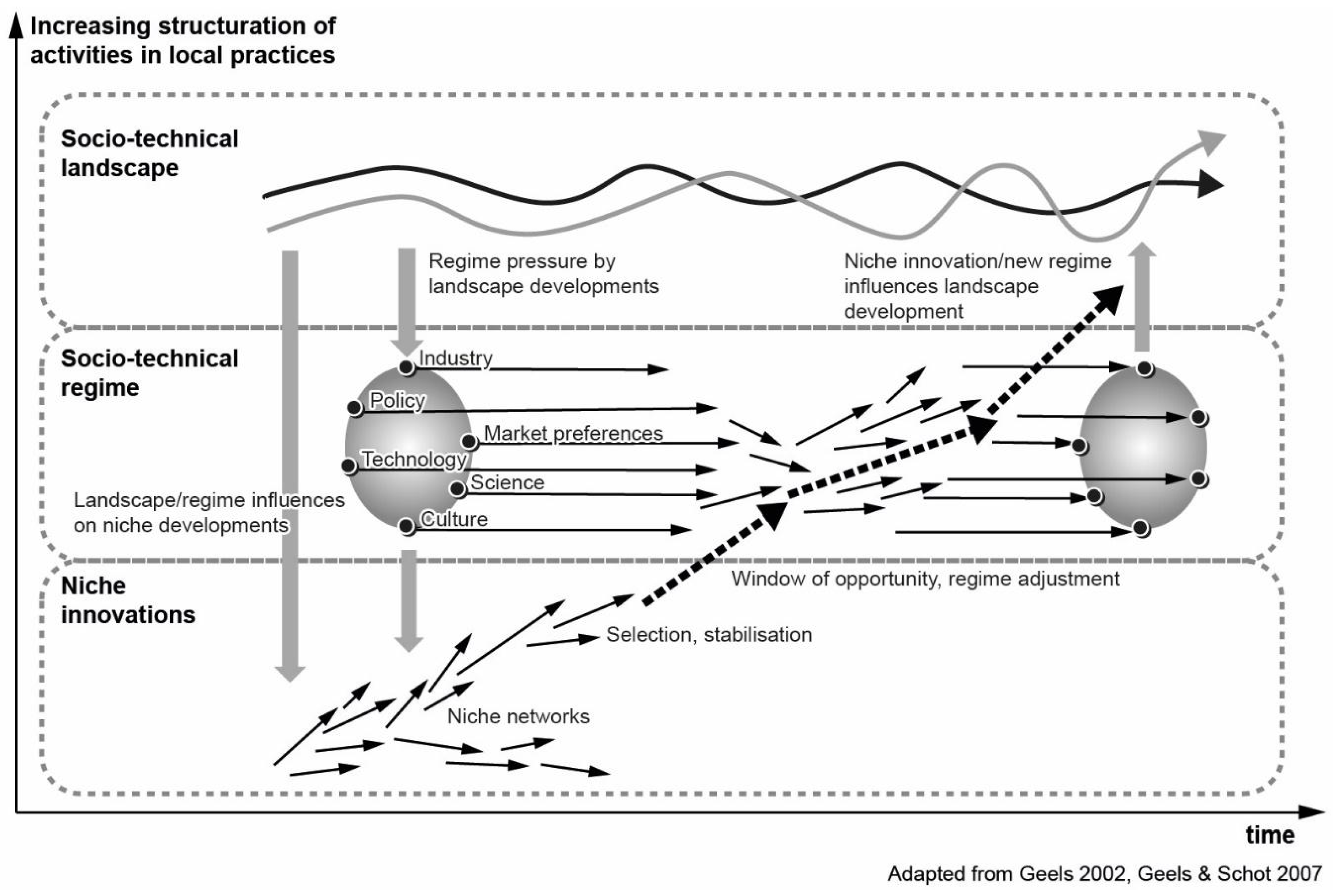
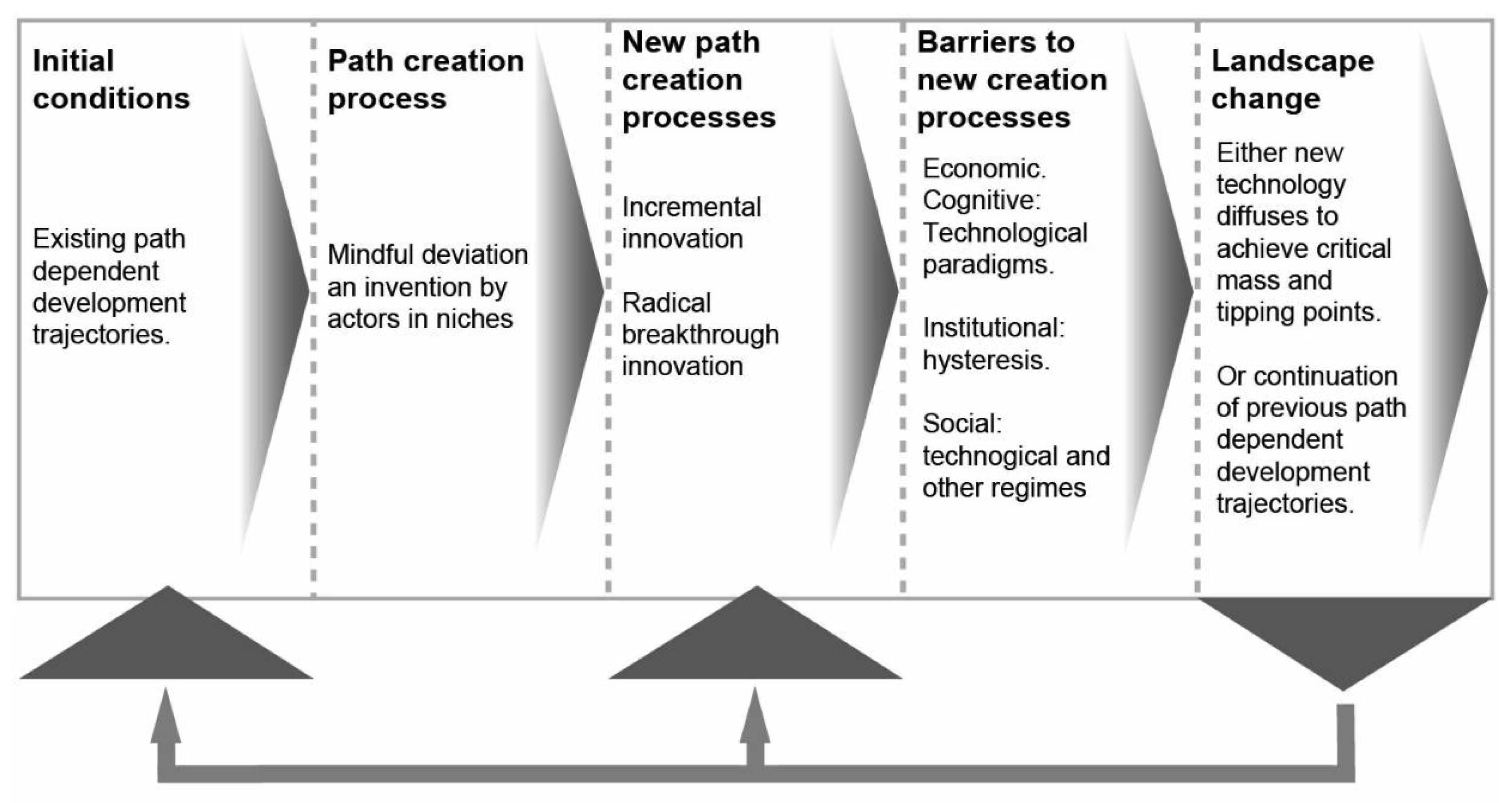
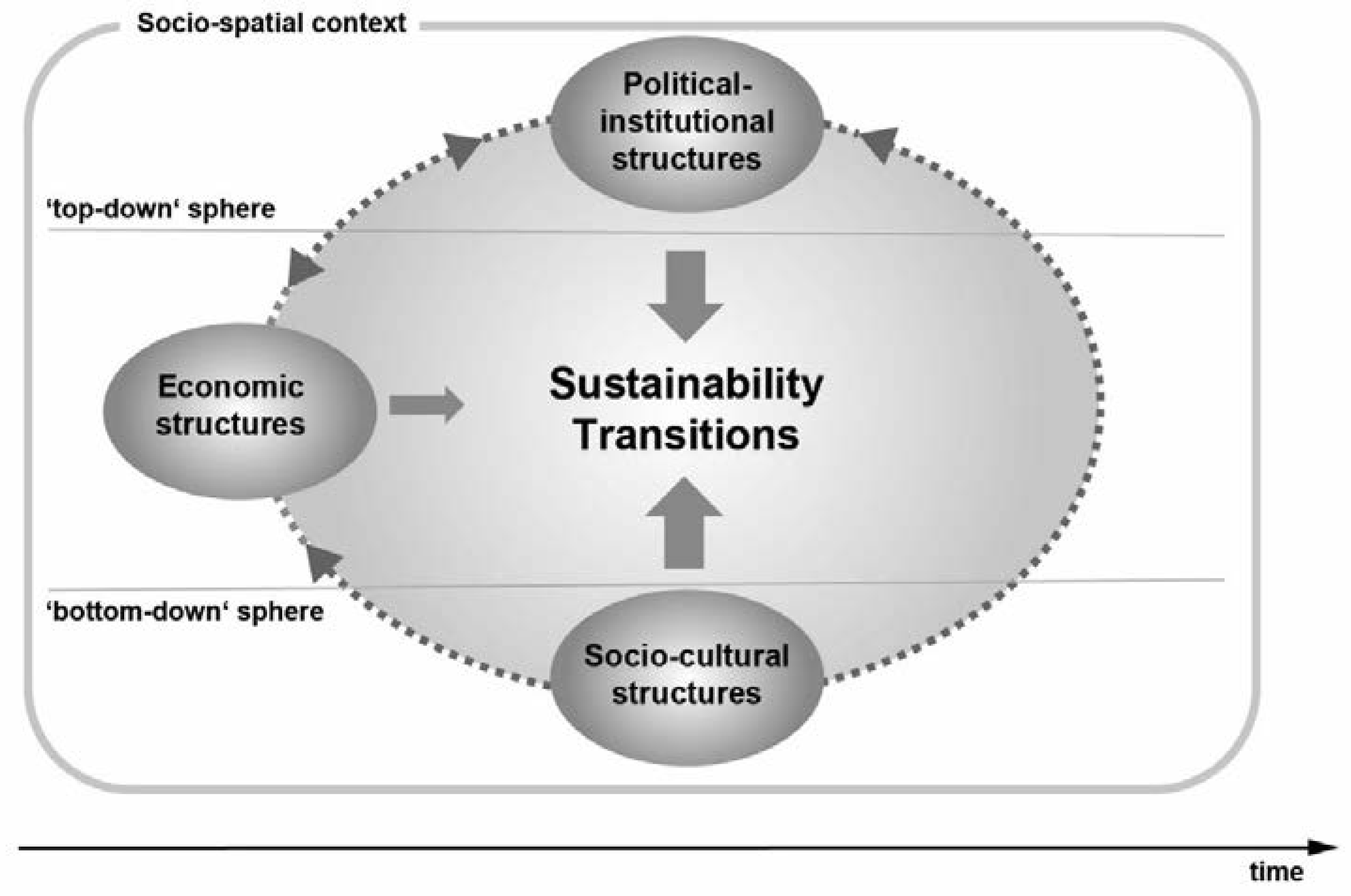
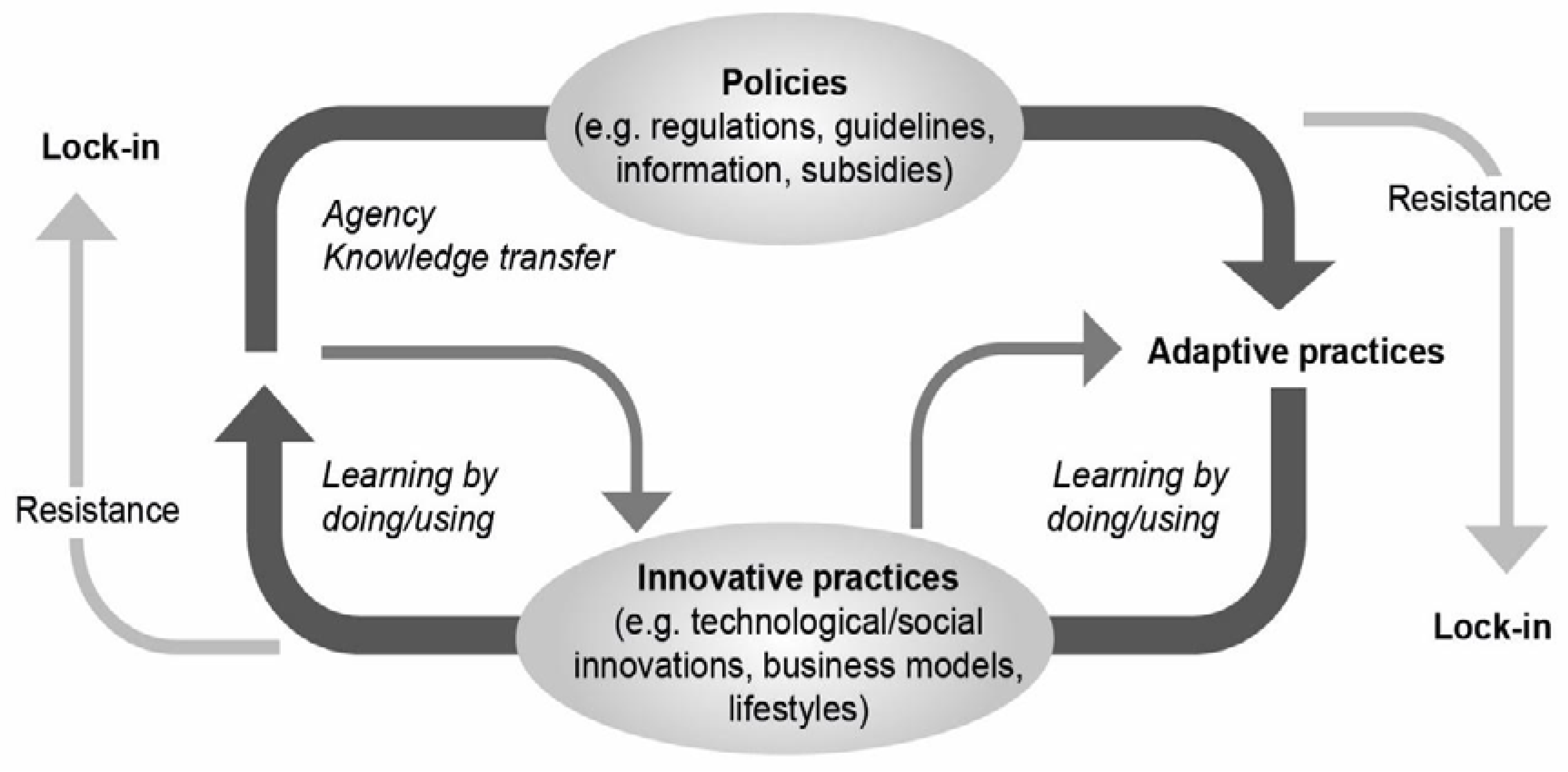
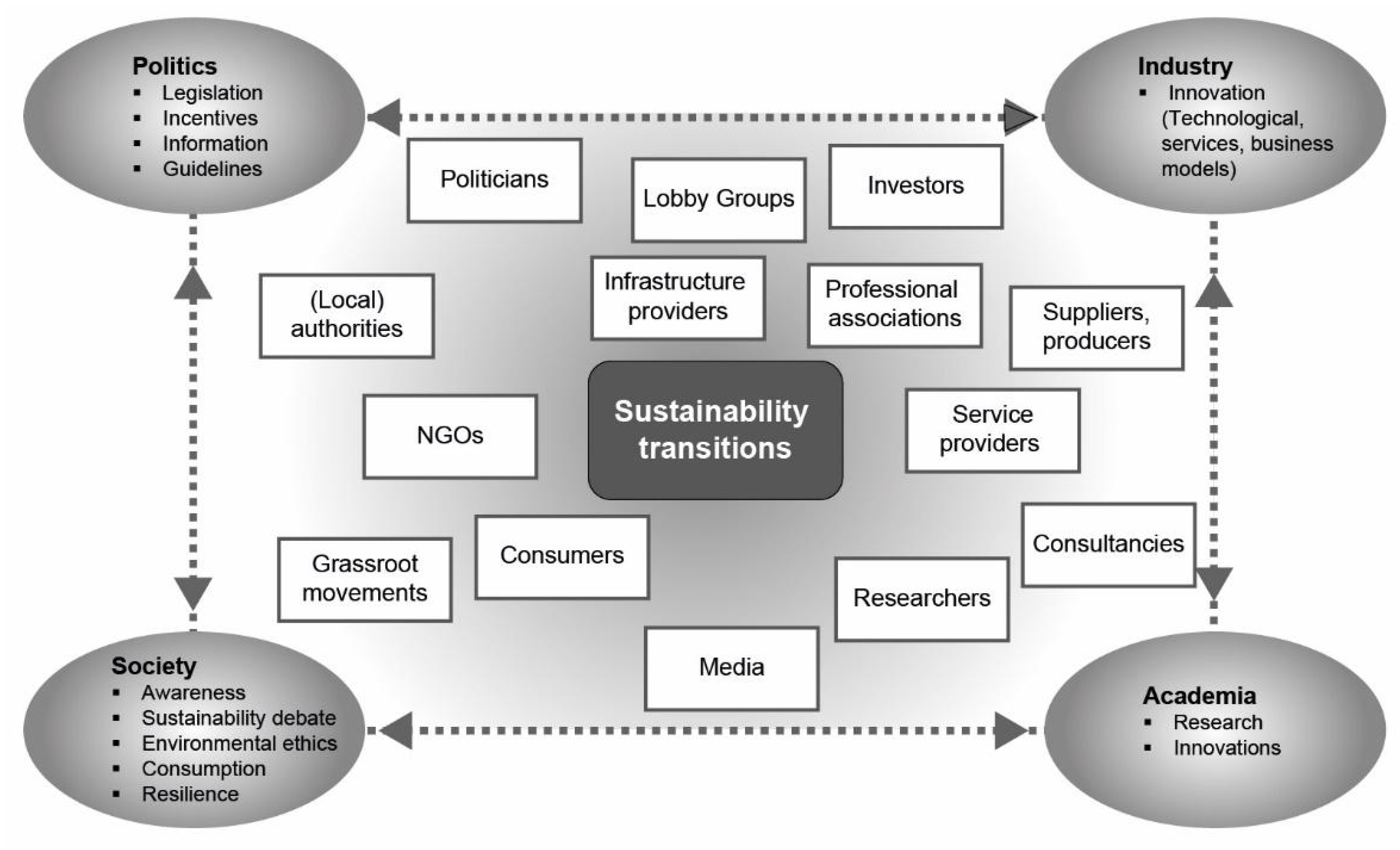
© 2018 by the authors. Licensee MDPI, Basel, Switzerland. This article is an open access article distributed under the terms and conditions of the Creative Commons Attribution (CC BY) license (http://creativecommons.org/licenses/by/4.0/).
Share and Cite
Fastenrath, S.; Braun, B. Lost in Transition? Directions for an Economic Geography of Urban Sustainability Transitions. Sustainability 2018, 10, 2434. https://doi.org/10.3390/su10072434
Fastenrath S, Braun B. Lost in Transition? Directions for an Economic Geography of Urban Sustainability Transitions. Sustainability. 2018; 10(7):2434. https://doi.org/10.3390/su10072434
Chicago/Turabian StyleFastenrath, Sebastian, and Boris Braun. 2018. "Lost in Transition? Directions for an Economic Geography of Urban Sustainability Transitions" Sustainability 10, no. 7: 2434. https://doi.org/10.3390/su10072434
APA StyleFastenrath, S., & Braun, B. (2018). Lost in Transition? Directions for an Economic Geography of Urban Sustainability Transitions. Sustainability, 10(7), 2434. https://doi.org/10.3390/su10072434





